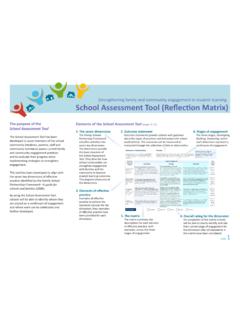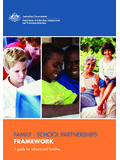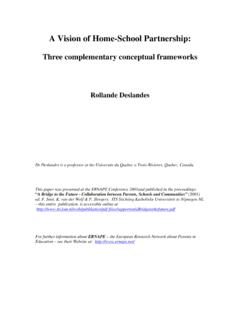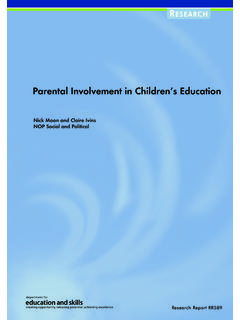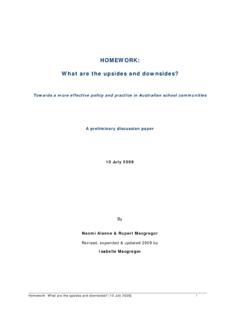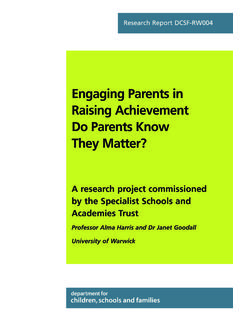Transcription of How to engage parents and - Family-School and …
1 How to engage parents and How to Evaluate that Engagement 1 How to engage parents - and How to Evaluate that Engagement A background information and discussion paper for MindMatters Health Promotion & Evaluation in School Settings Seminar Canberra: 27 28 July 2006 Mrs Jo Lonergan AM Senior Research Officer, Australian parents Council & National Director Families Matter Initiative Families Matter A resource for parents and families working in partnership with schools to support the well-being of young people How to engage parents and How to Evaluate that Engagement 2 How to engage parents - and How to Evaluate that Engagement Introduction I have been asked to talk about the peak parent organisations (ACSSO and APC) experience in the engagement of parents and the measuring of that engagement particularly through the Families Matter element of the MindMatters suite of programs.
2 The future funding of Families Matter is uncertain, so I am pleased to have at least this opportunity to talk about our concepts of parent engagement and the outcomes. A large part of the work of our organisations is concerned with research into the how and why of parent engagement with their children s schools and looking for ways to promote real partnership between families and schools and teachers and parents . Successive Australian Governments have supported our work. Just in the last month or so, the Minister for Education, Science and Training approved a new category for the 2007 National Awards for Quality Schooling - Excellence in Family-School Partnerships. Part of the rationale for that award says that; Working together, families and schools help students maximise their personal, social, academic and vocational development now and in the future ACSSO and APC work is underpinned by that belief.
3 This working together includes the engagement of parents as a group - a phalanx of support if you like, - for improving schooling outcomes for students and building the school community. School Culture and Parent Engagement The culture of schools, particularly secondary schools, does not often see parents and families as having a role to play in the school education of their children. The real and perceived barriers to parent engagement are well documented. We hear from schools and teachers that parents will not come, parents are not interested, older students do not want their parents around, parents make too many demands, and the school has all the experts. Teacher training does little to encourage an understanding of the strategies for and benefits of broad parent engagement.
4 From parents , we hear that schools are not welcoming, do not value the information parents have to impart about their children, do not share information about school and school goals and only contact them when something goes wrong. These perceptions and their effects can be challenged and overcome. If schools are to educate the whole child and provide them with the skills necessary for 21st Century living, school cultures need to change to a parent and family inclusive ethos especially now that the work of schools has broadened to include in the curriculum matters such as values, safety, citizenship, drug education, and health and well being. How to engage parents and How to Evaluate that Engagement 3 These are issues where parents have a role to play and influence to exert.
5 These are still the province of home and it is clear that congruence between what happens at home and at school necessarily leads to a greater sense of belonging and connectedness for students and their better assimilation of what is taught in the school. Families Matter Grounded in Research Families Matter is a process for parent engagement with schools with an accompanying program which explores the general underlying principles of health and well being. The resource is aimed at enabling parents to appreciate the elements of resilience and encourage these in their children in co-operation with the schools goals in this area. The process and the program draws on our research at three levels as to what works best in parent engagement and in fostering an ongoing family/school partnership.
6 Firstly: the general research over the last thirty or forty years, conducted in many countries which shows that when parents and family members become participants in children s education, there are profound and comprehensive benefits for students, families and schools. The second aspect of research was conducted in 2002 by ACSSO and APC when we asked focus groups of parents around Australia about a proposed resilience building resource. They told us they wanted a process that would not be characterised by principals and teachers talking down to parents on a deficit model many parents felt that principals and teachers are intimidating and authoritarian in their approach. They said that they wanted a program which provided opportunity and encouragement for parents talking and working with other parents , sharing their experiences in effect, engaging in a process of significant dialogue about how do you cope with life; and how do you help and support your children to develop positive coping skills.
7 They said that there should be access to such a program in primary school because they would be keen to develop awareness and coping skills in preparation for their children s adolescent years. They also said that primary school children and the schools themselves are more encouraging of their involvement. The third aspect of research comes from learnings from the iterative process undertaken in the roll out of Families Matter over the past 18 months to 2 years Learnings Learning 1. One of the principal learnings about the how to of the engagement of parents is that the school culture should have ongoing processes which welcome parents and provide a mutually respectful forum for their engagement.
8 Ongoing and embedded processes are needed because of the annual exit and entry of staff students and parents . New entrants need to be drawn in to a culture that appreciates, values and welcomes parents . Strategies to make this a reality require continuous effort and some resourcing. How to engage parents and How to Evaluate that Engagement 4 Learning 2 was that parents want a discussion not a lecture. So we developed a resource to be delivered by trained parents to their parent peers in association with a staff member. In the roll out of the resource to schools, schools self-selected by registering an expression of interest in response to our invitation to participate. Schools then appointed parents and/or staff members who attended a training day in the presentation and content of the program.
9 Learning 3 was that school leaders need to support the process and the concept and accept parents as presenters and discussion leaders. Then parents present to their parent peers and sufficient time is allowed for parents to participate in the activities and discuss the concepts as applied to their own experience of coping and parenting. Transferable Process Learning 4 is that the Families Matter process is transferable and capable of use with appropriate parent resources on a range of topics. It has been used successfully in other settings. Successful Learning in the Early years of Schooling; the Indigenous parent Factor is one current example. Indigenous parents are trained to present literacy learning material to their communities.
10 Workshops and training for this APC program, are in progress across all states and territories due to the demand from Aboriginal and Torres Strait Islander communities and educational bodies within the State, Catholic and Independent sectors. Learning 5 is that the broad engagement of parents in school projects and goals for student learning develops partnership between Families and Schools. This emerges from Families Matter but also from the recent evaluation of the Family/School Partnership Framework Project, funded by the Department of Education, Science & Training (DEST). That project involved 61 government and non-government schools across Australia trialling a family/school partnership project chosen by the school and supported with funding of $10,000 for each school.
